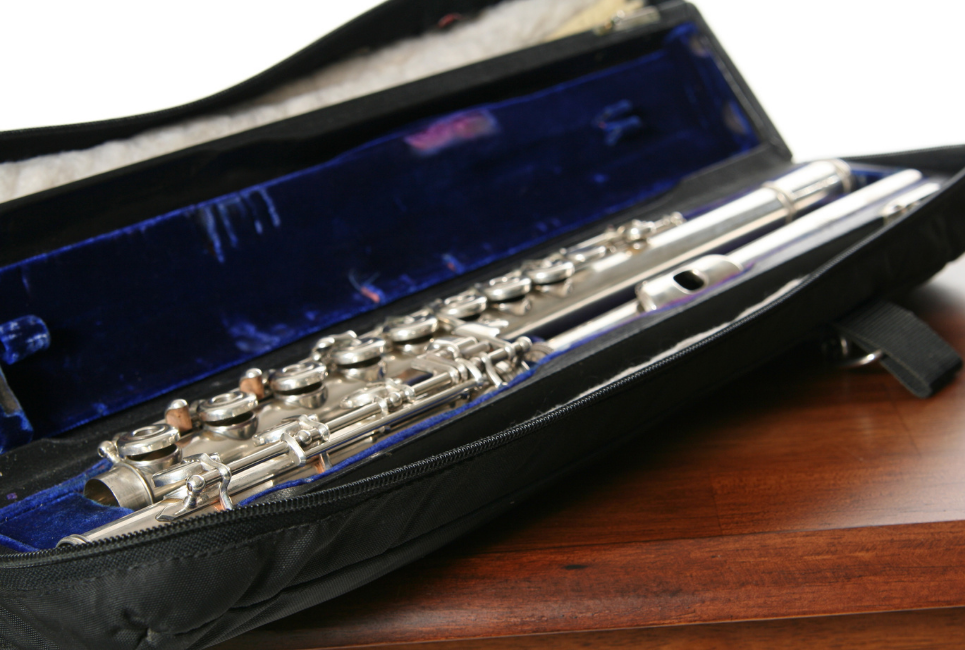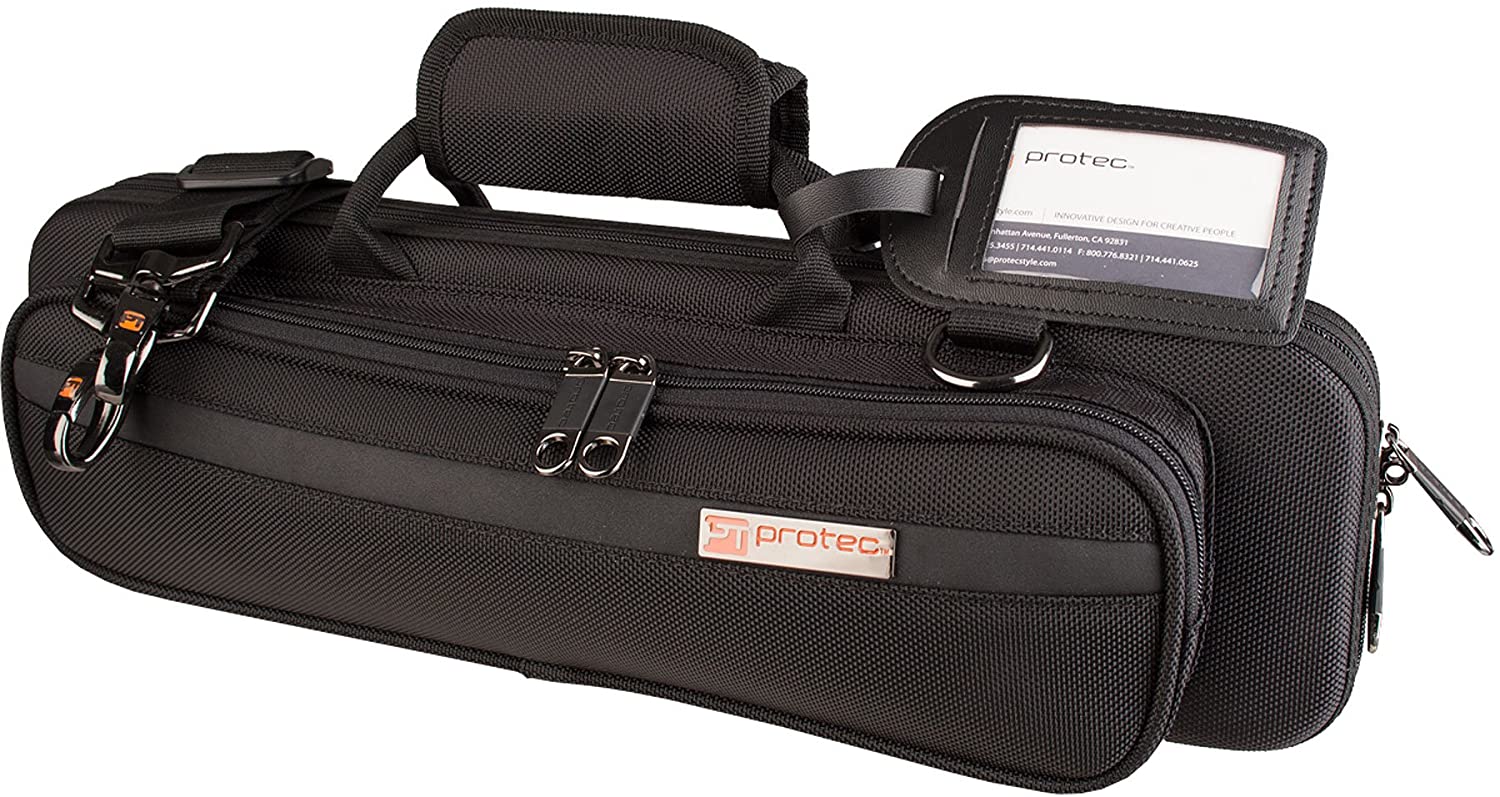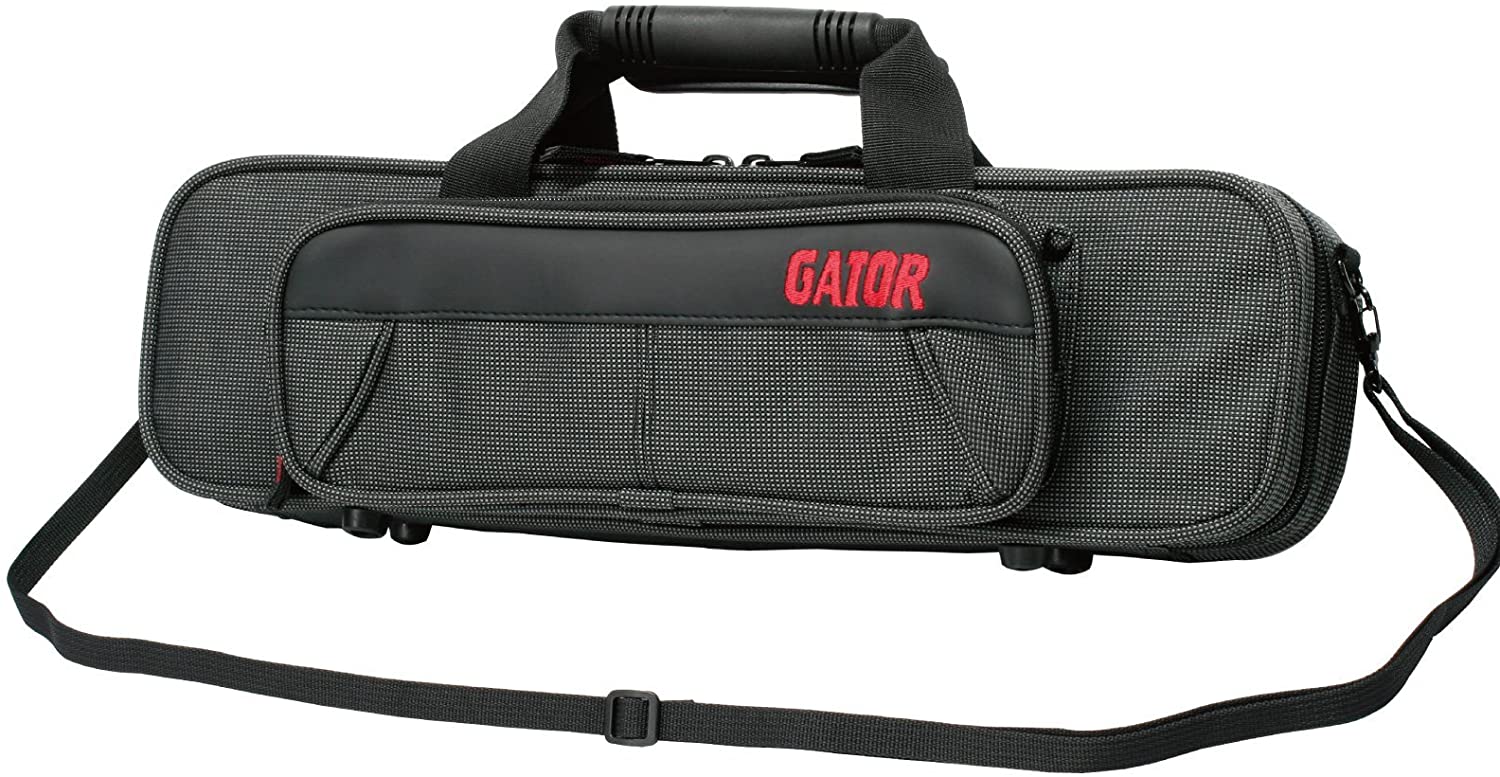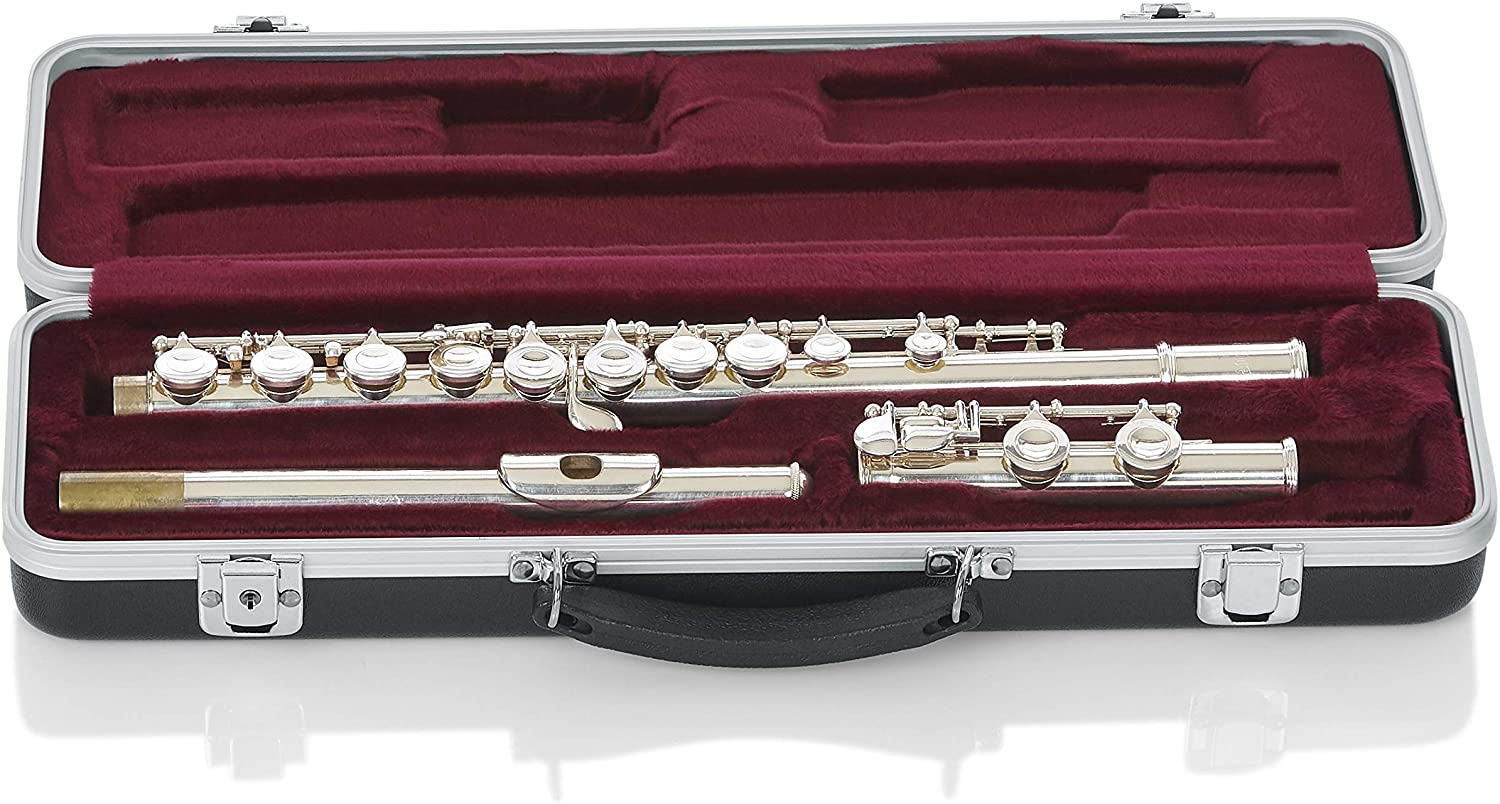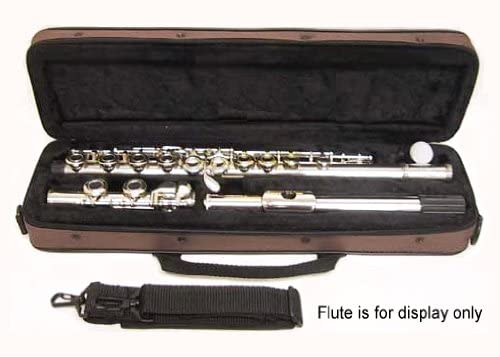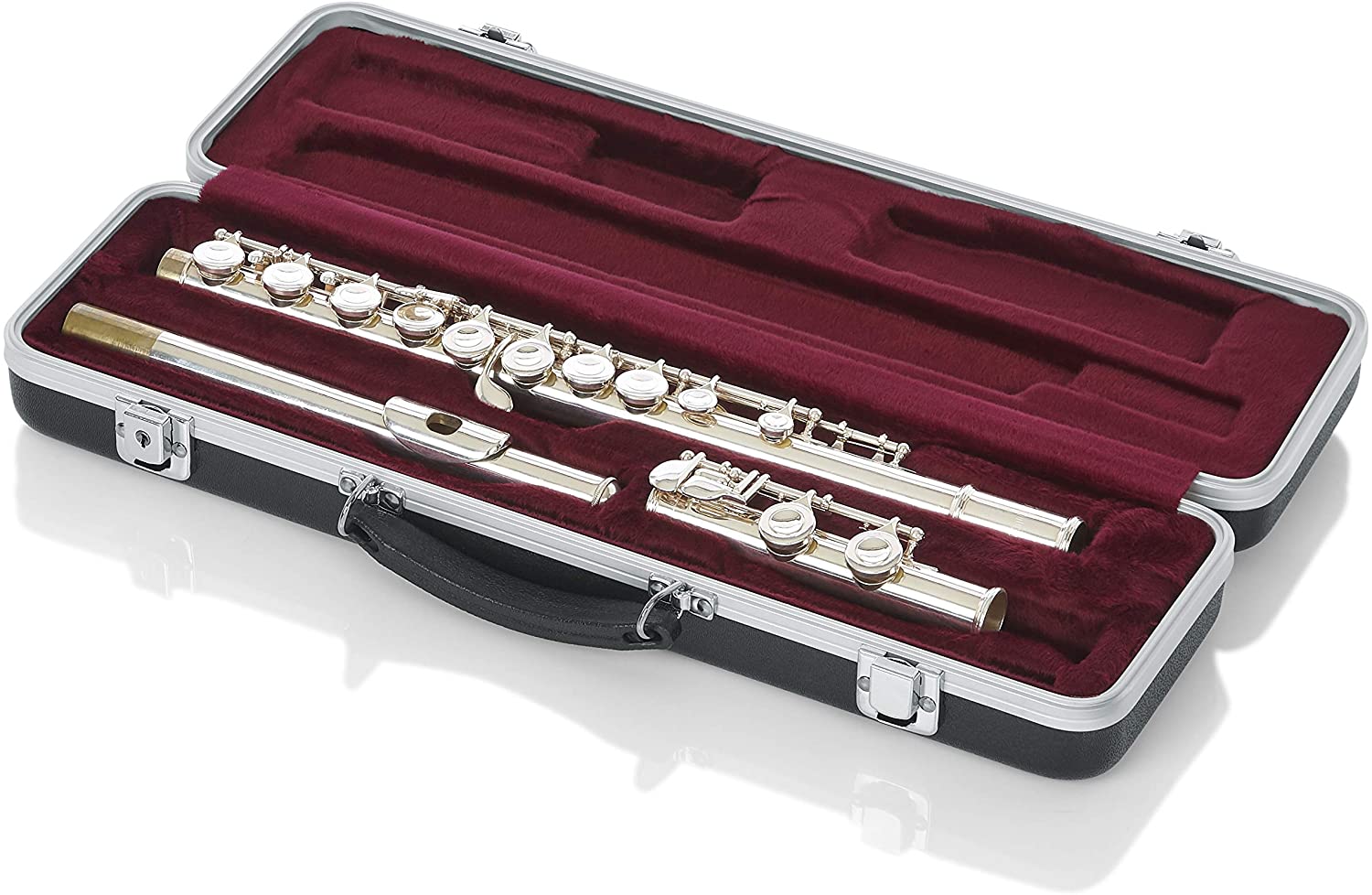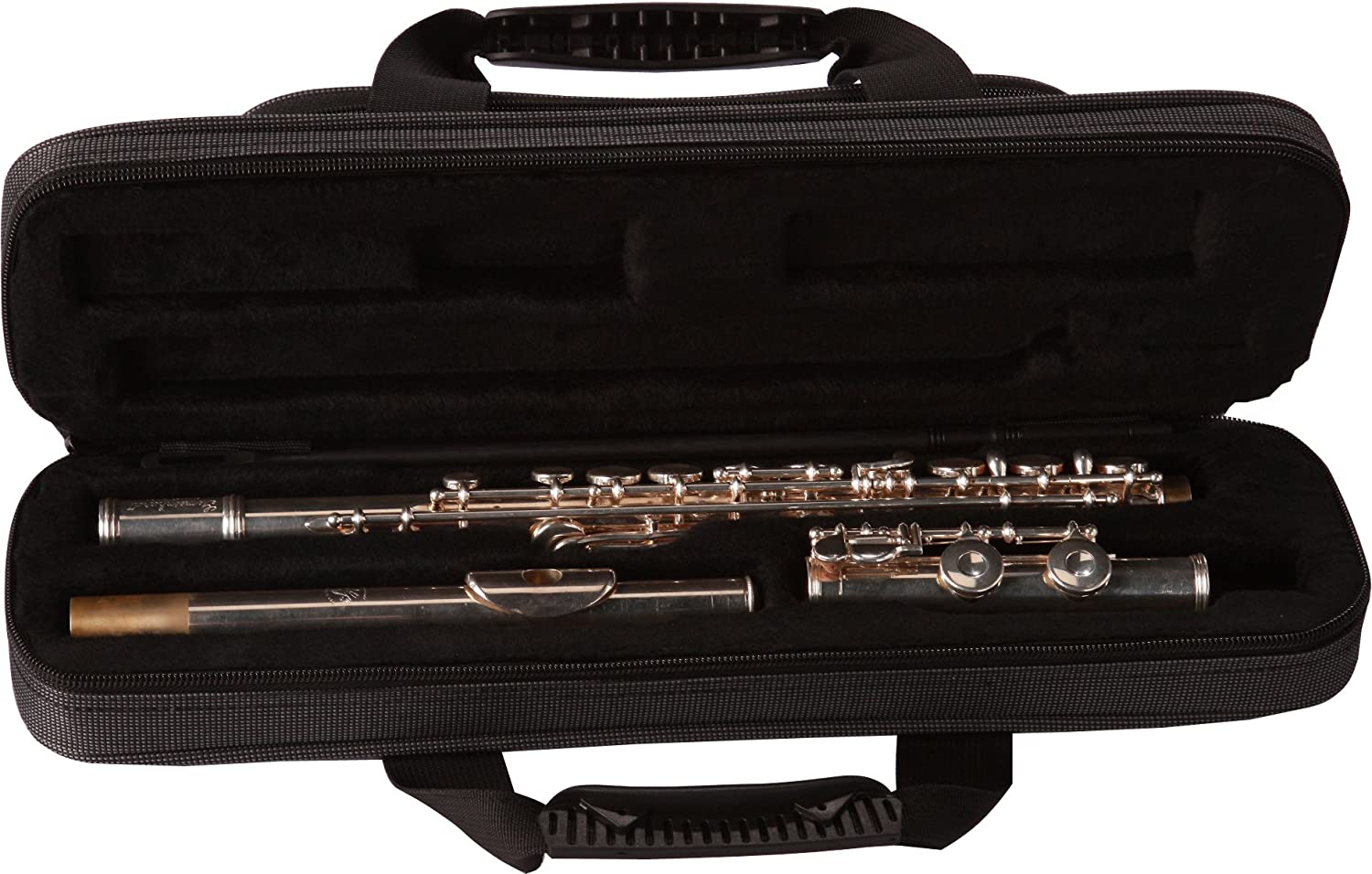- How to Find the Best 5 String Violins - April 19, 2022
- Top Violin Accessories to Consider - April 18, 2022
- Best Left-Handed Violins Guide - April 13, 2022
Chances are you have spent a great deal of time finding the best flute. Now you might be learning how to play the flute in private lessons or at school. So how do you keep your new instruments safe when going to and from classes or to and from performances? With a flute case.
Bottom Line Up Front: I have evaluated the best flute case options based on their design, characteristics, price point, and suitability for various musical levels. I recommend the Protec PB308 Flute Slimline Case for intermediates and professionals or students who want extra storage.
I like most the durability of the metal hardware, the impact-resistant interior alongside the weather-resistant exterior, and the large, gusseted storage pocket.
Of the best flute case options today, your decision comes down to the hard or soft case and a series of characteristics inside and out.
Selection Criteria
As I reviewed the best flute case options, I broke down my recommendations and viewpoint based on the design, characteristics, price point, and how suitable each flute case is for different skill levels.
For me, finding a good middle ground between price and suitability for your skill level is significant. I don’t like to spend money I don’t need to, especially if there is a more affordable option that will meet my needs sufficiently as a beginner.
Best Flute Case Options
Now let’s look at the best flute case options. There is something for everyone, regardless of skill or budget.
Protec PB308 Flute Slimline Case
The Protec PB308 Flute Slimline is great for intermediates and professionals who travel a lot. I love the gusseted storage pocket. This model has one of the most enormous storage pockets of any of the best flute case options. It has a built-in zippered pocket organizer inside the accessory pocket with a dedicated space specifically for your cleaning rod.
All of the hardware is robust, very durable metal hardware. The only main point of failure here is going to be the zippers. Zippers are notoriously the first point of failure, but the hardware used for these zippers is very durable. It has an adjustable shoulder strap that’s thickly padded and a comfortable handle that securely loops across the center of the case.
What’s more, the exterior is weather resistant. It also comes with luggage ID tags that are pretty visible and made of leather, so if you travel a lot, this will help you identify your flute case quickly.
Pros
- Impact-resistant interior
- Precision fit
- Gusseted storage pocket with organizer and dedicated cleaning rod pocket
- ID tags
- Multiple handles and traps
- Weather-resistant
Cons
- Only fits B or C foot flute
Gator Flute Case
I love the Gator flute case for beginners and all students. This is a beginner student model because it is a soft case. When you take your flute out of it, it doesn’t maintain its shape, so it will easily fall over and make it more challenging when you go to put the flute back. What I do like, however, is that you have multiple ways to carry it.
It has rubber feet on the bottom, so you can set it down without the bag sticking flush to the ground. This is particularly useful if you are constantly setting it down while on public transit or in a classroom.
It has a shoulder strap and a comfortable handle, which have grips on them so they won’t slide around. You also have good exterior pockets for accessories, although, given the size, you can’t fit sheet music in the accessory pocket.
Pros
- Interlocking grip handle in the center and over the shoulder pad
- Non-slip rubber for grips
- Lightweight
- EPS foam interior
Cons
- Meant for students
- Pockets won’t hold unfolded sheet music
- The case will fall over when you remove your instrument
Gator Cases Lightweight Molded Flute Case
Gator also makes the Gator Cases Lightweight Molded Flute Case. This particular model isn’t one of my favorite Gator cases because it doesn’t have any storage for accessories. Even though it is well constructed, with a lightweight ABS exterior hard shell, it doesn’t have many carrying options either.
The other Gator flute case makes it easy to throw your case over your shoulder, under your arm, as a backpack, or just hold it in your hand. With this lightweight molded case, you can only carry it in one hand, making it difficult for students.
It does have chrome-plated latches that prevent your case from accidentally opening, and the interior is form-fitted to protect your instrument.
Pros
- Heavy-duty construction
- Highly durable
- Bolted handle
- Chrome-plated latches
- It fits B and C foot models
Cons
- Not a lot of storage space
- No alternative options for carrying
Sky Flute Case
The Sky Flute Case is entirely waterproof. So if you live somewhere with rain, think heavily about investing in this model. It also weighs only 1 pound, so it won’t be a burden to carry around with you. I love that it has multiple carrying options and that you have a small exterior pocket for accessories.
This is a beginner model. It’s not a hardshell case but a rigid nylon exterior. You can find multiple colors, including coffee brown or rich purple velvet. The inside has foam suspension, so your flute will rest safely.
Again, it’s meant for beginners, so the hardware is not very durable, and the zippers are prone to wear out first. Still, it’s perfectly suited to students, especially younger students.
Pros
- Shoulder strap and carrying handle
- A mixture between soft and hard case
- Extra pocket for accessories
- Lightweight
Cons
- The hardware is not very durable
- Designed for students
Best Flute Case Options: What I Advise You Have in Your Next Case
When you are looking into a new flute case, whether it’s your first flute or your 50th flute, I advise you to look for the following:
Latches
When most people evaluate any type of instrument case, they focus almost exclusively on the aesthetics, whether it’s a hard case or a soft case. This is undoubtedly an important consideration, but I also encourage you to evaluate other characteristics like the type of latches on the case you get.
The hardware on a flute case can make the difference between an accident and the need for a new flute or a well-protected flute. The type of latches on your case will prevent it from accidentally opening. If you are a touring musician or you have a child musician in your home, rugged metal latches are the best investment.
Touring musicians need to ensure that as their instrument is passed through many different hands or transported across state lines, it doesn’t accidentally open. And children (at least my children) need to be protected against their clumsiness.
If you find a flute case you like, but you noticed that the latches are somewhat flimsy or aren’t made of a strong metal, you can have them professionally removed and replaced with something sturdier but given the cost, I would just advise you to look for a better case.
Interior Padding
It’s what’s on the inside that counts. This is true of cases. A good quality sleep case will have heavy padding on the inside along the perimeter. This is called the trench.
It will have sections where your flute can be held securely, and any accessories can be held securely. You don’t want your flute just rattling around, and you don’t want an interior space in the lining so large it doesn’t fit your instrument.
Room to Grow
If you have a child who is learning to play the flute and think that they will continue playing for the rest of their academic career, you might invest in a double case. This is a standard flute case that has room for two instruments. If you have an eight-year-old learning to play the flute, investing in a case that has space for two flutes might seem excessive.
Still, if your eight-year-old is going to continue playing throughout junior high and high school, once they reach high school, they will likely have more than one flute and will need to be able to carry their backup instrument with them at all times.
Conversely, if you have very young children like that 8-year-old and you’re not sure they will stick with it, don’t worry about the two flute designs until they reach high school.
Accessory Space
Finally, I absolutely recommend you make sure the flute case you choose has room for accessories. The amount of space you need is up to you. I always have accessories like cleaning cloths, tuners, replacement parts, metronomes, and sheet music.
And I don’t like having to carry multiple bags if I can help it. I prefer one case where all of my respective accessories can be stored. Since I play various instruments, each instrument case holds the respective accessories and sheet music for that instrument.
This video explains what types of things you might store in your flute case:
I recommend this to everyone. Children are prone to losing the things they need during rehearsals or lessons, but if it’s all in one case, a music teacher can quickly help them find it.
And professionals who are on the road a lot don’t need the extra stress of worrying whether or not they brought their spare parts or their metronome; instead, they can trust that it always remains in the accessory compartments.
Renting vs Owning
Suppose you have a child who is just starting to play the flute. In that case, you might be able to rent the flute from a music school or a music store in your area so that you don’t have to buy a new instrument (just in case they decide they don’t like it after one year, like all of mine seem to do no matter how much they promised to the contrary).
If you are renting, you will likely be able to rent a suitable flute case to go with the instrument.
If you decide to buy the flute or you already own a flute, when you get to determine if you want to purchase one of the best flute case options, new or used.
New vs Used
There are plenty of suitable flute cases that you can buy used. While there are some pieces I strongly advise against purchasing used (read: mouthpieces for any instrument), a case is not one of them.
Some people upgrade their flutes, so they need a corresponding case and sell the old one. Check your local area to see if you can find someone selling a used case.
Tips: If you are investing in a used case, exercise the same degree of inspection you would for purchasing a used instrument; make sure that all of the clasps, buckles, latches, or locks work properly OR that you will be able to fix them at little cost. Check that the padding inside is secure and can hold your flute.
With a used case, scratches, nicks, or dense to the exterior of a hard case aren’t much of a concern. In fact, they just proved that the case does its job and does it well.
FAQs
Answer: Depending on the case you have, a flute is easy enough to store in that you place it inside the case. The best flute case options have some sort of interior lining, called suspension.
This lining or suspension creates a space in which you place your flute. You will never open a flute case and find it empty like a piece of luggage waiting for your instrument to roll back and forth as you carry it. There will be a designated place where you put your flute, and depending on what you choose, designated places for flute accessories like sheet music.
Answer: Having any flute case is better than having no case for your instrument. A flute is a smaller instrument, so you might not consider how easily such instruments can be damaged, dropped, or stepped on.
However, when choosing the best flute case options, make sure they protect your instrument adequately. If you drop the case, a protective case will prevent your flute from breaking or cracking. It will also protect it from the elements like extreme heat, rain, or snow.
Answer: If you own a flute, it’s essential to do what you can to keep it in good condition. Keeping it clean is the first step. As is the case with any instrument, you should use a microfiber cloth to wipe down your flute every time you use it. You should wash your hands and brush your teeth before using them. You will have to clean the mouthpiece regularly.
Most importantly, when not in use, you need to keep your flute in a good flute case to protect it against scrapes, dents, bangs, getting stepped on, getting picked up, and playing with by a pet or getting lost.
Bottomline
I recommend the Protec PB308 Flute Slimline Case. This model has the largest storage pocket so that you can fit all of your flute accessories, not just a cleaning cloth. It also has an impact-resistant, lightweight interior with a weather-resistant exterior and long-lasting metal hardware.
No matter which flute case you choose, make sure that it fits your instrument, has the interior and exterior characteristics you need most, and falls within your budget. There are plenty of options out there for all skill levels.
Fore more interesting readings check out:

